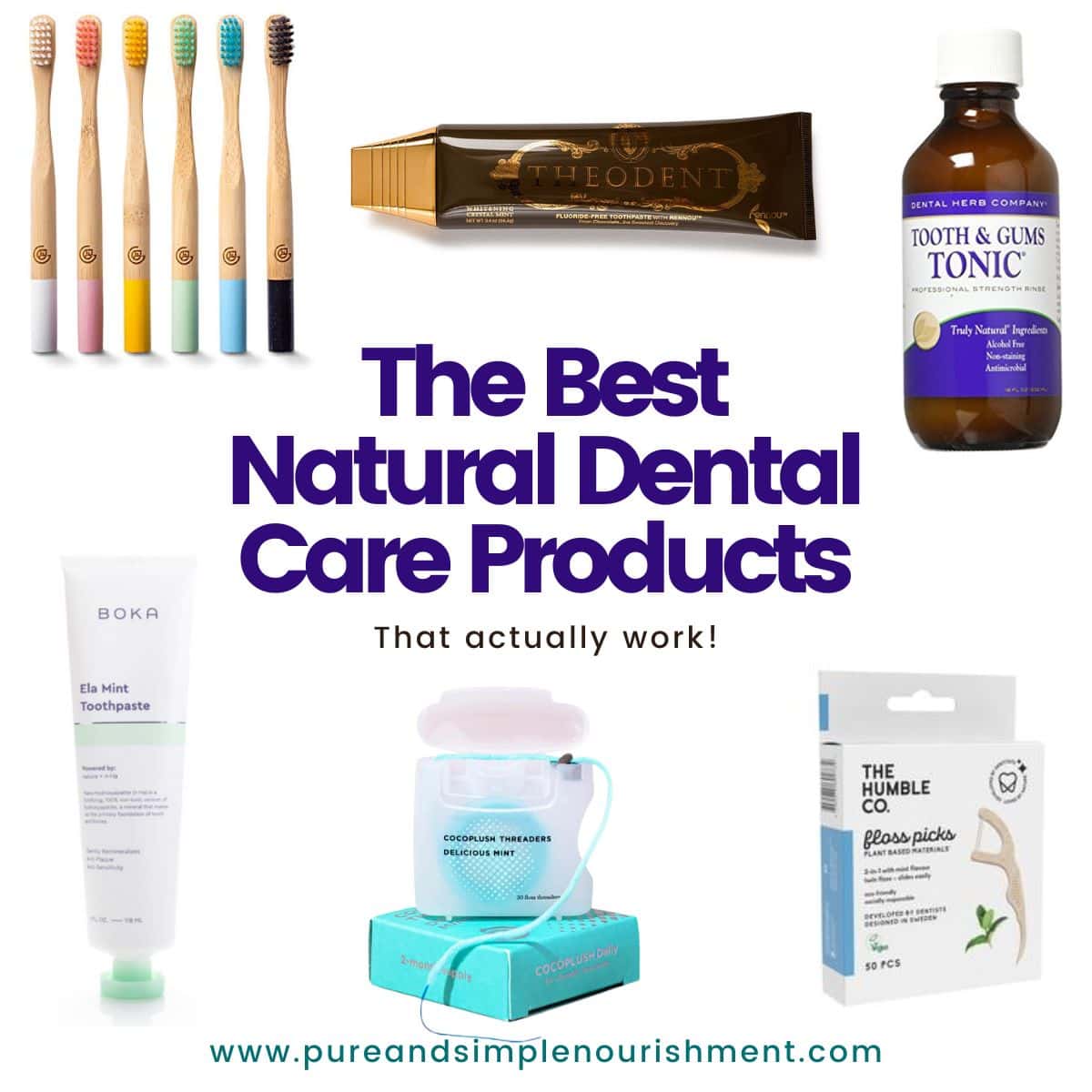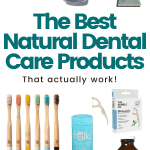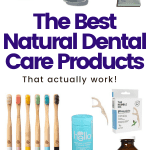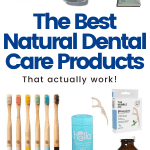This post reviews the best non-toxic oral care products including toothpaste, floss, mouthwash, toothpaste tablets and floss picks.

Disclaimer: some of the links in this post are affiliate links where I make a small commission if you purchase the product through that link. This does not cost you anything extra and helps me keep this website running.
Table of Contents
Why choose non-toxic dental products:
Taking care of your teeth and gums is very important. Not only does poor dental health put you at risk for cavities, tooth decay, gum recession, gum disease, dental infections and other local oral issues, but it also puts you at greater risk of developing systemic diseases such as rheumatoid arthritis. Because of that it's very important that you take good care of your teeth and gums. But, you want to make sure that the products you are using to clean your teeth and gums are safe and non-toxic.
Unfortunately, the personal care industry is very poorly regulated. And in some cases the ingredients found in personal care products and oral care products like toothpaste, floss or mouth wash can be harmful or toxic to your health. You don't want to have to sacrifice your overall health just to keep your teeth clean. You want to choose products that are good for your teeth and gums yet safe for your overall health too.
Fortunately, in recent years there has been an increasing consumer demand for non-toxic and natural personal care products including natural dental products and oral care products so it's not nearly as hard to find safe options as it used to be. You no longer have to worry about visiting specialty stores to find safe products to keep your teeth and gums healthy and clean. Most drug stores and grocery stores now carry non toxic and natural options.
Ingredients to avoid in dental products:
Before we get to the best natural oral products, I wanted to quickly review some of the potentially harmful ingredients that can be found in oral products such as toothbrushes, floss and toothpaste so that you know what to avoid when shopping.
1. Plastic
Plastics are full of potentially harmful chemicals including hormone disruptors that you really don't want to be ingesting or putting in your mouth. Most toothbrushes on the market are made of plastic, but instead of plastic toothbrushes I recommend using a natural toothbrush made of bamboo instead. They are great because not only are the better for your health, but they are compostable and biodegradable too so they are a more eco-friendly and environmentally friendly option.
2. Fluoride
Now I know this ingredient is controversial. There are differing opinions among medical experts and dental experts about whether you should use toothpastes with or without fluoride. I personally prefer using natural toothpastes that are fluoride free, given the potential health risks of fluoride including fluorosis, cognitive deficits, thyroid problems and potentially cancer. A recent meta analysis also found that “fluoride is a human developmental neurotoxicant that reduces measures of intelligence in children, placing it into the same category as toxic metals (lead, methylmercury, arsenic) and polychlorinated biphenyls.” The holistic dentist I see also recommends using a fluoride-free toothpaste.
However, many dentists do recommend using toothpaste with fluoride so if you prefer dental products with fluoride you will have an even easier time finding toothpastes. The good news when it comes to fluoride is that the negative health effects are related to ingestion of fluoride and most experts feel that the use of fluoride in topical agents like toothpaste poses little risk since very little of that fluoride gets ingested.
3. Artificial flavours, colours and fragrances
I also recommend using dental products that are free from artificial flavours, colours and fragrances to help you avoid any endocrine disruptors or other potentially toxic ingredients.
4. Dietholamine (DEA)
DEA is used to help toothpastes foam. Ethanolamines (DEA is a type of ethanolamine) have been banned from personal care products in Europe and Health Canada also prohibits the use of DEA in cosmetics and personal care products due to concerns regarding the formation of carcinogenic nitrosamines. However, these chemicals are still allowed to be used in other countries. There is also concern that these chemicals can negatively impact male fertility and animal studies have also shown concerning neurological effects.
5. PEGs
PEG compounds are formed by condensing water and ethylene oxide and while PEG compounds themselves are usually safe for our health, they can be contaminated with 1,4-dioxane, which is a known carcinogen.
6. Parabens
Parabens are added to toothpaste and other dental products as antibacterial agents. The concern with parabens is that some of them are known endocrine disruptors, or hormone disruptors. They can also cause developmental and reproductive toxicity. You can identify these in ingredient lists as they end in "paraben". When reading labels watch for ethylparaben, butylparaben, methylparaben, propylparaben, isobutylparaben, isopropylparaben etc.
7. Triclosan
Tricolsan is an anti-bacterial agent that can be added to toothpastes (it has been banned from soaps however). Animal studies have shown triclosan to be an endocrine disruptor and other studies show that it can alter your microbiome. Fortunately, this ingredient is not commonly used anymore but it's always good to double check ingredient labels.
8. Per- and Polyfluoroalkyl Substances (PFAS)
Unfortunately, more and more personal care products are being found to contain PFAS chemicals and recently many flosses have been found to contain evidence of these chemicals. These are the same types of chemicals that are used to make non-stick cookware. More specially, the same chemicals that are used in Teflon coatings.
This is concerning because PFAS and their related chemicals are extremely bad for our health and can cause numerous health problems including thyroid disease, renal cancer, impaired fetal development and increased risk of miscarriages, hormone imbalances, increased cholesterol, metabolic diseases and more. You really don't want to be ingesting PFAS chemicals.
The flosses that tested positive for indication of PFAS that you will want to avoid include: Oral-B Glide; Oral B Glide Pro-Health Deep Clean Floss; Up and Up Smooth Slide Floss Mint; Colgate Total Mint Waxed Dental Floss; Solimo Extra Comfort Mint Dental Floss; Burst Refillable Dental Floss Juniper and Berry; EcoRoots Bamboo Floss; Listerine Reach Ultraclean Floss; RiseWell Scrubby Floss; Rite Aid Premium Waxed Dental Floss; Wellnesse 100% Biodegradable Silk Peppermint Floss.
The Best Natural Oral Care Products
Now that we have reviewed some of the potentially harmful chemicals you want to avoid in oral care products, I will share my favourite natural oral care products, and ones that actually work! I have tested all of these products myself and will share my honest opinions, both the good and the bad.
Bamboo Toothbrushes
Brushing your teeth regularly is so important for your dental health. But most of the conventional toothbrushes on the market are made from plastic, which unfortunately is not only bad for our health, but is also bad for the environment. Instead of plastic toothbrushes I recommend using bamboo toothbrushes instead.
I have tried a number of bamboo toothbrushes over the years, and while I am not partial to any particular brand, lately I have been using the bamboo toothbrushes from Humble Co because they are a more affordable option that come in fun colors!
Non-Toxic Toothpastes
Another product that you want to ensure is safe and non toxic is the toothpaste you are using. There is a chance that you are going to end up ingesting some of that toothpaste so you want to make sure the ingredients in that product are natural, safe and healthy or non toxic. I have tried a number of non-toxic toothpastes over the years and my two favourites are:
Theodent Classic Toothpaste
Theodent Classic Toothpaste is my favourite non-toxic toothpaste. It's fluoride free and uses an ingredient called Rennou instead (which actually comes from chocolate!). It has whitening properties and it also foams like traditional toothpastes which I really like. When I started seeing a holistic dentist this was the toothpaste he recommended and I have been a fan ever since.
A couple cons of this toothpaste is that it is more expensive than some other brands and isn't sold in most stores and so needs to be ordered online.
Size: 3.4 ounces; 96.4 grams
Price: $16 USD
Boka Ela Natural Toothpaste
Boka Ela Natural Toothpaste is my other favorite non-toxic toothpaste. It uses nano-hydroxyapatite to help remineralize teeth, and it's also great for whitening. It's fluoride free and dentist approved. It also foams really nicely. I personally love the mint flavour the most.
This toothpaste is more affordable than the Theodent toothpaste which is why it's my second overall best pick. One con of this toothpaste is that it can be hard to find in Canada where I live and must be ordered online.
Size: 113 grams; 4 ounces
Price: $10.79 USD
And if you are looking for even more non-toxic toothpaste options I have a whole post dedicated to this topic that you can read.
Nobs toothpaste tablets
Instead of traditional toothpastes, some brands are now making toothpaste tablets. These are great because they don't come in tubes so they are free from plastic, produce no waste, and are therefore better for the environment.
NOBS toothpaste tablets are my favorite toothpaste tablets. They are fluoride free and are made with ingredients like nanohydroxyapatite, xylitol, coconut oil, calcium carbonate, and sodium bicarbonate. They are also perfect for travelling or camping.
Size: 62 tablets
Price: $19.99
Non-Toxic Floss
Cocofloss
Cocofloss is my personal favourite non toxic floss option that tested negative for indication of PFAS chemicals. It is a coconut-oil infused woven dental floss that comes in many different flavour options. It's also vegan, cruelty free and compostable. My personal favourite is the mint one. I like this floss the best because it doesn't shred or get stuck in your teeth like many other brands that I tried do.
This floss also comes in refillable packaging so it cuts down on waste.
Size: 33 yards per spool. Each spool is estimated to last about 2 months with daily use.
Price: Starts at $10 USD.
Humble Co Floss Picks
If you prefer floss picks or floss sticks my personal favorite are The Humble Co. Natural Dental Floss Picks. These are a great natural option that are plastic free, bio-degradable and vegan. They also tested negative for PFAS chemicals. This floss doesn't get stuck in your teeth or shred which is why they are my favorite floss picks.
Size: Packs of 50 picks
Price: $15.90 for 200 floss picks.
Mouthwash
Another great way to combat bad breath and help improve your dental health is by using mouthwash or mouth rinse. But again, you want to make sure the ingredients in your mouthwash are safe and non toxic in case you end up ingesting any of it.
As well, most conventional mouthwashes are made from alcohol and alcohol-based rinses are harsh and dehydrating for teeth and gums, and they can cause hypersensitivity in some peoples so you will want to avoid alcohol based mouth washes.
My personal favourite non toxic mouthwashes are:
Essential Oxygen Organic Brushing Rinse
Essential Oxygen Organic Brushing Rinse is great for many oral issues including teeth whitening, receding gums, tooth sensitivity, bad breath, tartar, and canker sores and each ingredient is all-natural and safe.
I really like how clean my mouth and teeth feel after I use this. I also use it to help clean my mouth guard! I have only tried the peppermint flavour so can't speak to how the other flavours taste but I do really like the mint one.
Price: $24.81 for 32 ounces.
Dental Herb Company Tooth and Gum Tonic
The Dental Herb Company Tooth and Gum Tonic is my favorite natural mouth wash and is the one my holistic dentist recommended when I first started seeing him. It is made with deionized water, vegetable glycerine, extracts of echinacea angustofolia, echinacea purpurea, gotu kola and many essential oils. This one does have a bit of a spicy flavour but I really like it. My mouth always felt so clean after using it.
Sadly you can't get this mouthwash in Canada anymore so I can no longer buy it, but for those of you who live in the US I highly recommend this mouthwash. Also note that it is more expensive than some other mouthwashes but it also comes in a glass bottle so is more eco-friendly than mouthwashes packaged in plastic.
Price: $34.85 for 18 ounces.
Other ways to improve your dental health:
Oil pulling is a great way to help improve the health of your teeth and gums. To oil pull, you put a tablespoon of oil (I prefer coconut oil) in your mouth in the morning when you get up, let it melt, and then swish it around for 5-20 minutes. Then spit it out and brush your teeth as you normally would. Oil pulling is also helpful if you suffer from dry mouth or have Sjogren's syndrome.
Another option for improving your oral health is tongue scraping. It’s best to scrape your tongue in the morning when your body is rested and before you eat. Bacteria sit at the base of your tongue and, if they are not removed, they can cause bad breath and an imbalance of oral bacteria.
Another very important factor for teeth and gum health is what you eat. Processed and refined ingredients wreak havoc on our teeth and gums. The book Nutrition and Physical Degeneration shows just how important what we eat is for our dental health. In fact, many of the dental disease that we see today are preventable just based on what we eat. As much as you can, stick to eating real food, and avoid white flours, sugars, processed ingredients and refined and artificial ingredients to help keep your teeth and gums healthy.
Frequently asked questions:
You can easily make your own natural mouthwash at home by combining 1/2 teaspoon baking soda, 1/2 teaspoon sea salt and 1 cup of distilled water. Mix the baking soda and sea salt with the distilled water and use it after brushing your teeth. Rinse your mouth well.
Other health information you will like:
- The best non-toxic deodorants
- Is there mercury in your mascara?
- Is mineral or chemical sunscreen better?
- How to choose safe cookware
- Are candles toxic?
Since you made it this far we are basically best friends so be sure to follow me on Instagram, Pinterest, TikTok and Facebook where I share even more recipes and healthy living tips!
Our expertise:
Dr. Erin Carter, MD, FRCPC, is a physician with board certifications in internal medicine and rheumatology. She is passionate about preventative healthcare including nutrition, environmental health and low toxicity living. She is also a self-trained chef and has been creating and publishing healthy recipes since 2015. Her recipes have been featured on many different websites and online publications.




Leave a Reply